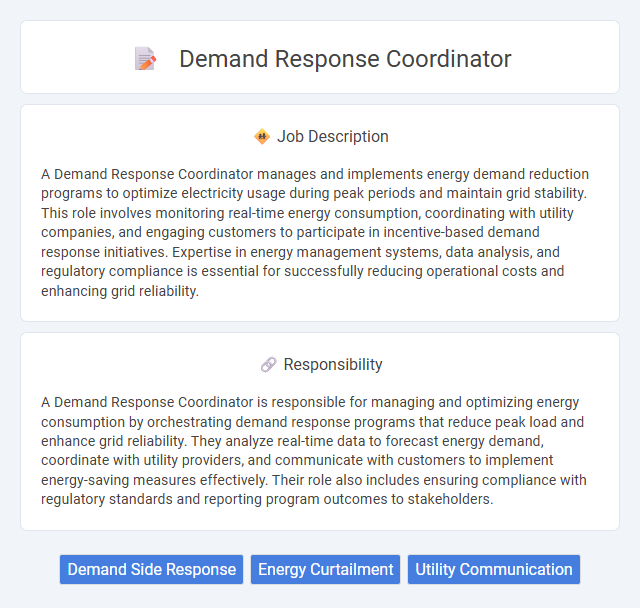
A Demand Response Coordinator manages and implements energy demand reduction programs to optimize electricity usage during peak periods and maintain grid stability. This role involves monitoring real-time energy consumption, coordinating with utility companies, and engaging customers to participate in incentive-based demand response initiatives. Expertise in energy management systems, data analysis, and regulatory compliance is essential for successfully reducing operational costs and enhancing grid reliability.
Individuals with strong analytical skills and the ability to manage complex systems are likely suitable for a Demand Response Coordinator role. Those who thrive in fast-paced environments and possess excellent communication abilities may adapt well to coordinating energy demand and supply effectively. People lacking attention to detail or struggling with multitasking might find this job less compatible with their skills and preferences.
Qualification
A Demand Response Coordinator must possess a strong background in energy management, electrical engineering, or environmental science, often requiring a bachelor's degree in a related field. Proficiency in data analysis, demand response software, and knowledge of utility regulations and energy markets are essential for optimizing load management programs. Effective communication and project management skills enable coordination between utility companies, customers, and stakeholders to implement efficient demand response strategies.
Responsibility
A Demand Response Coordinator is responsible for managing and optimizing energy consumption by orchestrating demand response programs that reduce peak load and enhance grid reliability. They analyze real-time data to forecast energy demand, coordinate with utility providers, and communicate with customers to implement energy-saving measures effectively. Their role also includes ensuring compliance with regulatory standards and reporting program outcomes to stakeholders.
Benefit
Demand response coordinator roles likely offer significant benefits including opportunities for influencing energy efficiency and grid reliability, which may contribute to sustainability goals. Professionals in this position probably gain valuable experience coordinating between utility companies and consumers, enhancing communication and operational skills. The job may also provide competitive compensation and opportunities for career growth within the evolving energy sector.
Challenge
Demand response coordinator roles likely involve managing complex energy usage patterns and ensuring real-time communication between utilities and consumers. It is probable that coordinators face challenges in integrating diverse energy sources while maintaining grid stability. Successfully navigating these obstacles requires strong analytical skills and adaptive problem-solving abilities.
Career Advancement
A Demand Response Coordinator plays a critical role in managing energy consumption by coordinating participation in demand response programs, optimizing load reduction during peak periods. Career advancement in this field often leads to positions such as Energy Manager, Demand Response Program Manager, or Sustainability Consultant, leveraging expertise in energy markets and regulatory compliance. Strong analytical skills and knowledge of smart grid technologies significantly enhance promotion prospects and industry recognition.
Key Terms
Demand Side Response
A Demand Response Coordinator manages and optimizes Demand Side Response (DSR) programs to enhance grid stability by incentivizing consumers to adjust their energy usage during peak demand periods. This role involves data analysis of energy consumption patterns, coordinating with commercial and industrial participants, and ensuring compliance with regulatory standards to maximize cost savings and reduce grid stress. Expertise in energy management systems, real-time load forecasting, and communication with stakeholders is essential for effective DSR implementation and grid efficiency.
Energy Curtailment
A Demand Response Coordinator manages energy consumption by implementing curtailment strategies to reduce demand during peak periods, minimizing strain on the grid and lowering operational costs. This role involves analyzing real-time data, coordinating with utility providers and consumers, and executing automated or manual load shedding protocols to optimize energy usage. Proficiency in energy management systems, communication skills, and a strong understanding of grid operations are essential to successfully drive effective energy curtailment initiatives.
Utility Communication
A Demand Response Coordinator plays a crucial role in managing communication between utility companies and consumers to optimize energy usage during peak demand periods. They develop and execute strategies to engage customers through direct notifications, automated systems, and real-time data analysis, ensuring timely responses that balance supply and demand. Expertise in utility communication protocols and advanced software platforms is essential to facilitate seamless energy conservation efforts and regulatory compliance.
 kuljobs.com
kuljobs.com